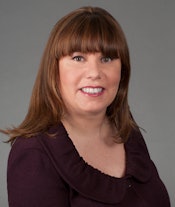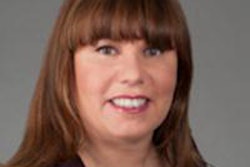
I had the nightmare of diagnosing my mother's terminal cancer myself, and she was dead within the week. This was after months of state-of-the-art care rendered by doctors at an esteemed academic medical center. I figured she must be in trouble when she let her daughter have anything to do with her care!
As the MR images came up on the screen, with a huge mediastinal mass, her spine destroyed, and paraspinal masses everywhere, I had to figure out how to tell her she was dying -- and had to face it myself. I had an educated hunch that an MRI would be the key to unlocking her diagnosis, but her doctors did not think it necessary (too expensive?).
How could this have happened in this millennium?
 Dr. Mary Morrison Saltz.
Dr. Mary Morrison Saltz.
Poor communication of information; poor communication and ineffective use of available technology. Had the spine MRI been done earlier, it would have been enough to make a diagnosis, make her comfortable, and allow us all some precious time to say goodbye.
The appointments with multiple specialists, extensive testing, and endless hospital visits could have been circumvented by spending the money up front to do the right imaging test. The expensive MRI could have saved a lot of healthcare dollars, and a lot of pain and suffering too.
Radiology has a bad rap: "got to cut down on expensive testing," "can't afford it anymore" ... Maybe we need to think differently about it, and ponder how to maximize the strategic effect of doing the right test early.
Patient care today pivots around imaging, and yes, it is expensive; however, judicious imaging can and does improve care. Knowing when to do which test is not easy, and formulaic decision trees are a start but not good enough. Doctors have resisted automated decision support because it often does not help and, instead, is an unwelcome barrier, providing little advantage. We cannot reduce each patient to fit those constrained boxes, and march forward like automatons.
How can we do better? Can we all get smarter, or maybe just work harder? More CME cruises?
Or is there more we can do to leverage technology to help us? As physicians, we rely on our education, our intelligence, and our experience to deliver the best possible care to our patients. But as long as we may live and practice, we will never have the experience of treating a whole population. What if the wisdom and experience gleaned from a population were available to help guide and support us in care delivery?
What if rather than flat-out discouraging the expensive tests and making doctors jump through hoops to get an MRI on a patient, we had a way to support doing the right test at the right time, even if it means spending more money up front? Or give us the support we need to defend not doing a test that is often done, but which we think is unnecessary.
The pivotal role of imaging is clear: We need to make sure we do the right test, at the right time, to get the right results, and use them to make the right decisions. Double back to make sure we did not miss something, or maybe help us think of an option we might not have considered.
Replacing doctors with computers is not possible, but integrating sophisticated, state-of-the-art technology to help us make informed decisions is critical. Give care providers the tools to help decide what test should be done first, what to skip, when to circle back and repeat a study, or maybe when to have the results reviewed because they just don't fit.
Radiologists should have the information they need about a patient before interpreting an exam. We don't have time to identify the critical information from the medical record for each case. Currently, a link to the electronic medical record (EMR) is a double-edged sword -- who has time to find the information and read the whole thing?
Maybe it happened in an academic setting with residents, but I can't remember the last time I read the EMR, even though it is linked to PACS, yet we are "responsible" for the whole record. When we do get the pertinent data, we can make a much better interpretation. What if the pertinent history were automatically culled for every case?
Using all of the information available to decide how to treat a patient is much more powerful than using the smaller subsegment usually available to us. Information is knowledge, and knowledge is power. Seizing the power of information is our job as physicians of this millennium, and technology is here to stay.
Who says doing the MRI first is not allowed? We need to decide what is allowed, and have the data to support us. Let's start with low-hanging fruit -- expensive imaging -- and make it work for us, and work for our patients today and tomorrow.
What do you think?
Dr. Mary Morrison Saltz is a board-certified diagnostic radiologist who is currently the chief medical officer for Hospital Radiology Partners, a national radiology contract management and consulting company based in Atlanta.
She has served as radiology chair and service chief at hospitals in Florida, Ohio, and most recently at Emory Johns Creek Hospital in Johns Creek, GA. Dr. Saltz is a member of the American College of Physician Executives, the American College of Radiology, and the Radiological Society of North America, and she sits on the Citizens Advisory Council of the Duke Cancer Institute in Durham, NC.
Dr. Saltz has more than two decades of experience in turning around problem radiology departments in three states. As a hands-on leader, Dr. Saltz's expertise is working hand-in-hand with hospital administration to guide the radiology teams to success. Dr. Saltz has led quality assurance programs in Florida and Ohio, and served as chief quality officer for community practice initiatives at Emory Health Care. She also has more than 20 years of private practice experience.
She is a graduate of McGill University, with a Bachelor of Science in Human Genetics, and Duke University, where she obtained her Doctor of Medicine. Her postgraduate education included a residency at Boston University where she served as chief resident, and a fellowship in interventional abdominal radiology at Massachusetts General Hospital.
The comments and observations expressed herein do not necessarily reflect the opinions of AuntMinnie.com, nor should they be construed as an endorsement or admonishment of any particular vendor, analyst, industry consultant, or consulting group.



















